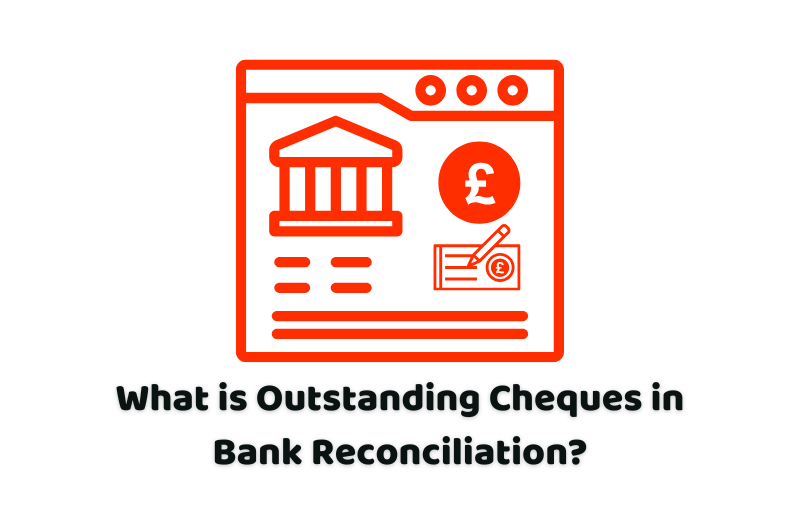What is Outstanding Cheques in Bank Reconciliation?
Bank reconciliation is the process which is crucial for growth and maintaining transparency in the business. It’s the end of the financial year when most businesses do their bank reconciliation, and you are doing the same as others. What if you are done with bank reconciliation and your balances in the records do not match? One of the reasons can be outstanding cheques. What is outstanding cheques in bank reconciliation and what happens if you encounter such a problem? This article contains all the related information you need.
Talk to one of our intelligent and clever professional bookkeepers to get your further queries about bookkeeping services in London. We will ensure to come up with the best possible solution for you.
What are Outstanding Cheques in Bank Reconciliation?
Bank reconciliation is the process of comparing the transaction and payment records on bank statements and the company account register or manual record that an individual has of his expenses. At the end of the process, balances in both records should align giving a clear idea of the cash flow of the company or individual.
Companies usually hire accountants for bank reconciliation. Accountants collect bank statements from the bank and all the manual records available at the company office to carry out the bank reconciliation procedure. They adjust the bank statement as well as company records to match the balance at the end.
What is the Procedure for Bank Reconciliation in the UK?
The following steps are carried out during a bank reconciliation purpose:
- Collect the data: The data from the bank is in the form of a bank statement and called the company account register.
- Compare the entries: Compare each entry on both records. Same-date entries should show the same balance.
- Adjust the bank statement: The bank statement may be somewhat different from the company register. The total amount in the bank statement may be larger. They could be due to bank fee charges added by the bank in the bank statement. Moreover, other added amounts by the bank could be interest rates or insurance charges. The accountant deducts such amounts from the bank statement to make it equal to the company account register.
- Adjust the account register: The next step is to adjust the entries in the company account register. For this purpose, the accountants look for any in-transit amounts that are added to the company record but are yet to be cleared up by the bank. There may be advance payments added to the account register of outstanding cheques. The accountants remove all these entries to make the account register balance equal to the bank statement.
- The balances should be the same: After making all the adjustments and required changes, the balances at the end of the bank reconciliation should be the same.
Visit our more detailed guide on what is bank reconciliation, we have covered in-depth knowledge of bank reconciliation over there.
What are the Benefits of Bank Reconciliation?
Below are the benefits of carrying out the bank reconciliation procedure:
- It ensures transparency in the cash flow of the company.
- It clears all discrepancies in the transactions.
- Point out any illegal transaction or fraudulent activity by the employees.
- Ensure the smooth flow of payroll.
- Gives a clear picture of company growth and helps design plans.
What is an Outstanding Cheque in Bank Reconciliation?
The outstanding cheques are the cheques that are not cleared up by the bank due to low or insufficient balance in the issuer’s account. In such a case the cheque is said to be bounced and returned to the client. However, in some cases, banks clear the payment to the businesses by deducting the amount from their most recent deposit.
What to Do About an Outstanding Cheque?
If a cheque is bounced by the bank there are a few things you can do
- If the outstanding cheque is less than six months old, keep track of the amount in your account and that mentioned on the cheque. You can also ask the client if he has cashed out the cheque from the bank.
- If the bank is older than 6 months, ask about the bank policy regarding expired cheques and how the bank stops an old payment.
- If you have enough money now in your account, contact the cheque-holder about the payment. If he wants the payment on the same cheque or wants, you to issue a new one.
Why Outstanding Cheque is Important in Bank Reconciliation?
The accounting of outstanding cheques is important to keep track of the cash transactions from your account. You should also follow the outstanding cheque if they are still useable by the client or they are expired. This is to keep transparency in business relationships.
Conclusion
The outstanding cheque in bank reconciliation is the cheque that is not cleared by the bank due to a low or insufficient balance. It is important to keep track of outstanding cheques in bank reconciliation as it is related to transactions from the company account and affect the client and company relationships. The outstanding cheques in bank reconciliation are also important to keep the company’s business transparent and keep track of the financial assets of the company.
Disclaimer: All the information provided in this article on outstanding cheques in bank reconciliation, including all the texts and graphics, is general in nature. It does not intend to disregard any of the professional advice.

